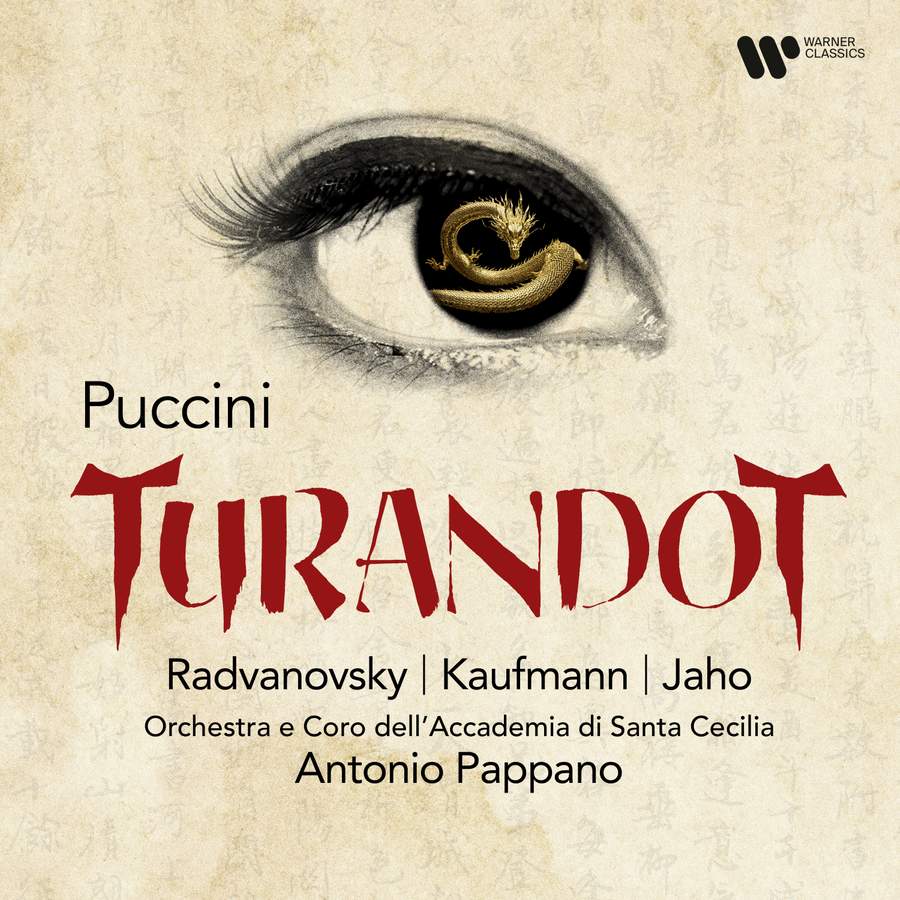PUCCINI Turandot (Pappano)
View record and artist detailsRecord and Artist Details
Genre:
Opera
Label: Warner Classics
Magazine Review Date: 03/2023
Media Format: CD or Download
Media Runtime: 125
Mastering:
DDD
Catalogue Number: 5419 74065-9

Tracks:
| Composition | Artist Credit |
|---|---|
| Turandot |
Giacomo Puccini, Composer
Antonio Pappano, Conductor Ermonela Jaho, Liù, Soprano Francesco Toma, Prince of Persia, Tenor Gregory Bonfatti, Pang, Tenor Jonas Kaufmann, Calaf, Tenor Mattia Olivieri, Ping, Baritone Michael Mofidian, Mandarin, Baritone Michael Spyres, Altoum, Tenor Michele Pertusi, Timur, Bass Santa Cecilia Academy Chorus, Rome Santa Cecilia Academy Orchestra, Rome Siyabonga Maqungo, Pong, Tenor Sondra Radvanovsky, Turandot, Soprano |
Author: Mark Pullinger
When Antonio Pappano’s recording of Tristan und Isolde was released in 2005, it was touted in many pages, including these (8/05), as marking the end of star-studded studio opera recordings. While it’s true that most opera on record these days is captured via the cheaper options of filming stage productions or recording in concert, there are still notable exceptions. Palazzetto Bru Zane and Opera Rara lavish premium quality on rare repertoire and there are occasional big-budget projects with star singers, such as this new recording of Turandot … conducted by Pappano.
Rather than at his Royal Opera House base, this Turandot was made in Rome with his other band, the Orchestra dell’Accademia Nazionale di Santa Cecilia (he leaves both posts soon). There’s plenty of fierce local competition on record: Erich Leinsdorf and Francesco Molinari-Pradelli both recorded it with the Opera di Roma; Alberto Erede with the Santa Cecilia.
Turandot is a repellent opera – a grotesque fairy tale featuring a pair of unsympathetic protagonists – but Puccini composed brilliant music for it. The orchestral performance here is outstanding. Pappano captures all the savagery of the score, its ceremonial pomp and oriental glitter magnificently recorded. It’s bloodthirsty stuff; even the pizzicato strings are laced with menace. The Santa Cecilia chorus, Covid-distanced, are terrifying, spanning the full stereo sound picture, baying for blood. Incredibly, Pappano has yet to conduct Turandot in the opera house; that changes this month when he leads the final revival of Andrei Serban’s Covent Garden staging before it falls to the executioner’s axe.
Turandot’s toughest riddle is the puzzle over the ending. Puccini died before writing the final duet and the opera was completed by Franco Alfano. Arturo Toscanini, conducting the premiere, famously put down his baton to end the performance after Liù’s suicide, announcing to the audience: ‘Here the maestro laid down his pen.’ Some stage directors take their cue from that example, including new productions last year by Ai Weiwei (Rome) and Barrie Kosky (Amsterdam). Luciano Berio composed a new ending, recorded by Riccardo Chailly (Decca, 5/04), but it never caught on.
The Alfano ending is seen as problematic, an implausible ‘happy ending’ in which the ice princess melts all too quickly into the arms of Calaf. Yet the Alfano ending is really ‘Alfano II’. Toscanini objected to the original completion, enforcing cuts of over 100 bars to create the standard version. The original Alfano has been recorded before, by John Mauceri on a programme of opera finales, but Pappano’s adoption of it is the first time it has adorned a complete recording.
On paper, Pappano’s lead singers look pretty damn starry: Sondra Radvanovsky, Jonas Kaufmann and Ermonela Jaho. But glance at previous recordings and you realise that top-notch casts were the norm back then: Birgit Nilsson and Inge Borkh (Turandot), Franco Corelli, Jüssi Björling and Mario Del Monaco (Calaf), Renata Tebaldi and Renata Scotto (Liù). Then along came Decca and Zubin Mehta in 1973 with the surprise assumption of the title-role by Joan Sutherland. Factor in Montserrat Caballé and Nicolai Ghiaurov as a luxuriously cast Liù and Timur, and Luciano Pavarotti’s golden tonsils for the most famous recording of ‘Nessun dorma’ ever made, and the competition is stiff.
Pappano’s cast stands up well. Radvanovsky’s soprano has serious ‘blade’ and her Turandot is truly imperious; her ‘Straniero, ascolta!’, as she sets the first of her riddles, raised the hairs on the back of my neck. She unleashes the final duet with massive power, but where the score calls for pianissimo moments they are essayed tenderly. Kaufmann’s dusky baritonal tenor makes for a less heroic or hot-headed Calaf than the bull-in-a-china-shop Del Monaco or Corelli, almost eliciting sympathy for the character. ‘Non piangere, Liù’ is sung with great sensitivity and ‘Nessun dorma’ sounds terrific (also served up as a bonus track with concert ending). Kaufmann holds his own against Radvanovsky in ‘Alfano I’, where the extended duet convinces in context.
Ermonela Jaho sings a heartfelt Liù. Hers isn’t as glamorous a tone as Tebaldi’s but her vocal acting is superb, making her devoted slave girl utterly believable. Michele Pertusi’s bass-baritone sounds grey and careworn, appropriate for Calaf’s elderly father, Timur, whereas Michael Spyres adopts a grey, careworn voice for the ancient Emperor Altoum. Mattia Olivieri, Gregory Bonfatti and Siyabonga Maqungo are lively courtiers, their Act 2 trio, a perfumed flower amid a blood-soaked score, beautifully sung. A Turandot for the ages? This recording holds its own against venerable competition and, in the original Alfano completion, is unique.
Discover the world's largest classical music catalogue with Presto Music.

Gramophone Digital Club
- Digital Edition
- Digital Archive
- Reviews Database
- Full website access
From £8.75 / month
Subscribe
Gramophone Full Club
- Print Edition
- Digital Edition
- Digital Archive
- Reviews Database
- Full website access
From £11.00 / month
Subscribe
If you are a library, university or other organisation that would be interested in an institutional subscription to Gramophone please click here for further information.




